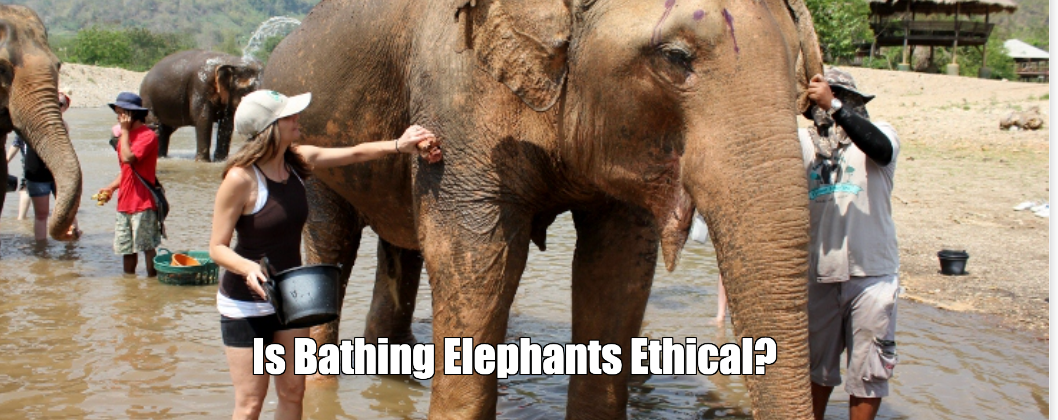
Is Bathing Elephants Ethical?
Summary
Pros
- Conservation Awareness: Some ethical elephant bathing experiences contribute to conservation efforts, raising awareness about the need to protect these majestic animals and their habitats.
- Support for Sanctuaries: When done responsibly, the funds generated from elephant bathing can support sanctuaries that rescue and rehabilitate elephants, providing them with care and a safe environment.
- Educational Value: Ethical interactions can educate tourists about elephant behavior, biology, and conservation challenges, fostering a deeper appreciation and respect for wildlife.
Cons
Bathing elephants is a popular activity in places like Thailand, where people wash and interact with these majestic animals in rivers or pools. However, it’s important to consider their well-being. Not all elephants are treated kindly, and some are taken from their families and trained harshly to obey.
To ensure that these animals live happy and healthy lives, free from harm and stress, it’s crucial to support places that care for their elephants properly. Always choose ethical wildlife experiences.
Bathing elephants, a common tourist attraction in several countries, has sparked a significant debate on its ethical implications. This activity, often marketed as a unique opportunity to closely interact with these majestic animals, raises questions about animal welfare, conservation, and ethical tourism. This review delves into whether bathing elephants is ethical, examining various perspectives and considering moral obligations towards these creatures.
Understanding the Practice
Elephant bathing involves tourists participating in washing and scrubbing elephants in rivers or designated pools. It’s promoted as an immersive experience, offering a connection with nature and wildlife. However, the backdrop to this seemingly innocent activity is complex and warrants a closer examination of the ethical considerations involved.
Ethical Concerns
The primary concern revolves around the welfare of the elephants involved. Many of these animals are kept in captivity and are made to interact with tourists daily. This raises significant ethical questions regarding their quality of life, freedom, and the stress associated with constant human interaction. The ethical debate hinges on whether the needs and well-being of these animals are adequately met in such settings.
Animal Welfare
Animal welfare is at the heart of the ethical debate on bathing elephants. Ethically, it is paramount to ensure that animals are treated with respect, their natural behaviors are not unduly restricted, and they live in environments that cater to their physical and psychological needs. Unfortunately, in some instances, the conditions under which elephants are kept for bathing activities fall short of these ethical standards. Reports of inadequate living conditions, insufficient medical care, and the use of force to train and control the animals are not uncommon. Such practices are undeniably unethical, as they compromise the elephants’ well-being for entertainment and profit.
Conservation and Education
Proponents of elephant bathing often argue that the activity raises awareness and funds for elephant conservation. They claim that these interactions foster a deeper appreciation for elephants, encouraging conservation efforts. While education and conservation are noble goals, the ethical question arises whether direct interaction through bathing is the most effective and moral approach. True conservation efforts should prioritize the natural behaviors and habitats of elephants, focusing on their long-term survival in the wild rather than short-term human entertainment.
Ethical Tourism
Ethical tourism emphasizes responsible travel practices that do not harm the environment or exploit animals and local communities. From this standpoint, the ethicality of bathing elephants depends on the context in which it is conducted. If the activity supports genuine conservation efforts, respects the natural behaviors and needs of the elephants, and ensures their welfare, it could be considered ethical. However, if it prioritizes profit over animal welfare and involves cruelty or exploitation, it is undoubtedly unethical.
Alternatives and Solutions
Given the ethical concerns associated with bathing elephants, it’s crucial to explore alternatives that allow for responsible interaction with wildlife. Sanctuaries and conservation centers that prioritize the well-being of elephants and offer educational tours without direct interaction are viable options. These establishments can provide insights into the lives of elephants, their conservation status, and the challenges they face, all while ensuring the animals are not subjected to stress or exploitation.
Also read: Is Boohoo Ethical?
Conclusion
The ethicality of bathing elephants is not straightforward and depends on the conditions under which it is done, the treatment of the animals, and whether it contributes to conservation efforts. Keeping the welfare of the elephants in mind is important and should be prioritized over entertainment and profit.
To interact with these amazing creatures ethically, tourists and operators should practice activities that respect and preserve the natural dignity and well-being of elephants. Encouraging ethical tourism practices can lead to a sustainable and responsible relationship with the natural world.

